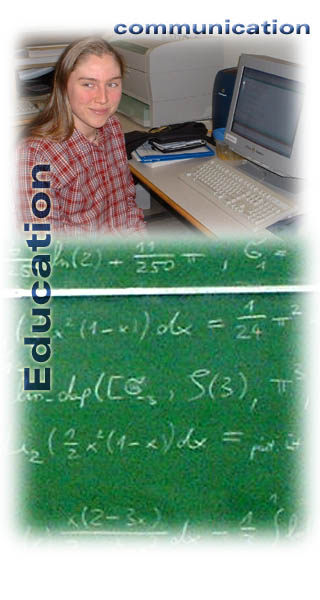

|
|
|
|
|
|
|
|
|
|
|
 |
 |
||||||||
|
|
|||||||||
|
|
|||||||||
|
|
|||||||||
 |
What is SAMPLE? The Development of a Framework for Online Mathematical Learning In this age of increasing technological complexity, mathematics learning is arguably one of the most fundamental and pressing concerns for citizens in a fully literate, functioning society. In the new economy, not only must people deal with basic mathematical issues that arise with the day-to-day use of technology (e.g. the mathematical construction of a Boolean web search - the "and"s and "or"s), but almost every career choice requires familiarity and understanding of complicated mathematics and abstractions. At the same time, mathematics scores across the country have been in decline for several decades. While educators and administrators may argue the causes, there is no disagreement that students at all school levels must be able to deal with increasingly more sophisticated mathematics within in a technological context.
This project, funded by SSHRC's Initiative on the New Economy, is seed grant funding to develop a major research proposal in online support for mathematics education at the K-12 level. In collaboration with our corporate partner, we are conducting a significant, multi-disciplinary investigation into a topic of major theoretical and practical importance to the New Economy: The development of a framework for the design and deployment of online mathematics learning materials to support the education of Canadians.
Specifically, we are investigating the role of an online mathematics learning web portal for K-12 (especially middle-school) students, their teachers and their parents. The seed funding is to develop a test bed prototype that prepares for the subsequent major research proposal. The goal of the subsequent major project is to examine the use of innovative teaching methods in an online interactive context to enhance the learning of mathematics in the K-12 sector. Currently, most online mathematics is still very focussed on technology "how" issues, rather than focussing on the integration of the use of technology within the learning context. (Related Links.) While there are many important technical issues to be dealt with, the main thrust of this project is developing systems that move past jamming technology into mathematics education to consider how best to exploit the technology for the learning process of mathematics - facilitating the interconnections between events that happen onscreen and the related mathematical content those events represent. |
 |